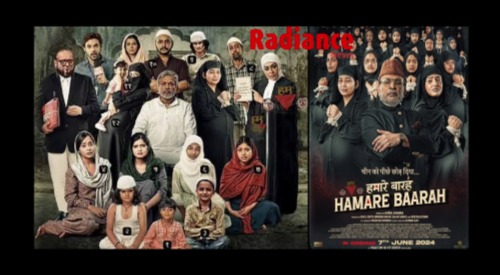New Delhi, June 2: The upcoming Hindi film “Humare Baarah” has sparked significant controversy and backlash even before its release, following in the footsteps of recent films criticized for their perceived anti-Muslim narratives, such as “The Kerala Story,” “The Kashmir Files,” and “72 Hoorain.” The film, which has drawn ire for its portrayal of Indian Muslims and Islamic practices, is set to release on June 7.
The film’s trailer, which features veteran actor Annu Kapoor, has been accused of perpetuating harmful stereotypes about Muslims. A particularly contentious scene features Kapoor’s character, a devout Muslim with 12 children, suggesting that large Muslim families are responsible for India’s population growth. Another scene shows a woman in a burqa questioning why only women go to hell, which critics argue misrepresents Islamic teachings.
Directed by Kamal Chandra and set in Uttar Pradesh, the film stars Annu Kapoor and Parth Samthaan. It deals with themes of population control and religious practices but has been condemned for its portrayal of Muslim families as overly reproductive and oppressive towards women. Critics argue that the film, like others before it, propagates Islamophobic stereotypes and could further prejudice against the Muslim community.
Lead actor Annu Kapoor has claimed that the film’s crew received death threats and warnings of violence over the film’s content. The trailer, released on May 30, has since been pulled down from online platforms.
Prominent Muslim groups and critics have called for a ban on the film, drawing parallels with other films accused of anti-Muslim bias. They argue that “Humare Baarah” could exacerbate discrimination against Muslims.
Director Kamal Chandra has defended the film, stating that it aims to explore different interpretations of Islam through the struggles of a family. However, the film’s portrayal of a Muslim man with eleven children, his oppressive religious practices, and his wife’s pregnancy complications have been criticized as regressive and damaging.
Muslim leaders and scholars have united in their condemnation. Maulana Khalid Saifullah Rahmani, President of the All India Muslim Personal Law Board (AIMPLB), criticized the film for spreading hatred and misrepresenting Islamic teachings on marriage and family. He called for Muslims to counter the film’s negative messaging by promoting true Islamic principles of compassion and understanding.
Various organizations, including the Jamiatul Ulama Hind, Raza Academy, and the Welfare Party of India, have demanded the Central Board of Film Certification (CBFC) ban the film, citing its potential to incite communal tension and defame Muslims. Scholars like Prof. Akhtarul Wasey and Mufti Mukarram Ahmed have also called for legal action against the filmmakers for hurting religious sentiments.
Despite the controversy, producers Ravi S. Gupta and Birender Bhagat expressed pride in the film, stating that it reflects the essence of the story and would resonate with viewers. With the film’s release imminent, the debate over its content continues to highlight the broader issues of religious representation and the power of cinema in shaping public perception.




